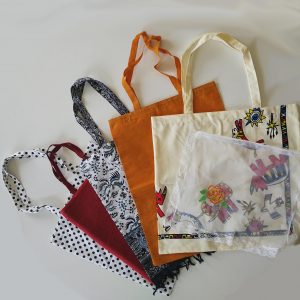016: Top Tip Thursday, Shopping Plastic Free with Mariska Nell

In this episode, I will be sharing with you some om my favourite tips, how you can reduce the amount of waste created during your weekly groceries shopping. These tips have helped us save a lot of waste from going to a landfill or recycling facility, but it has also helped us to save money, by minimizing our food waste.
Episode Highlights
[00:55] Plastic grocery bags, you can switch them out for reusable bags.
[01:11] In Abu Dhabi, Waitrose, an upmarket grocery recently added a 0.25 fills fee per single-use plastic bag as part of a 12- week trial. During their trial, they reduced the amount of single-use plastic bags by 74% and have seen a drastic increase in the purchasing of reusable bags.
[01:55] I would recommend investing in a few reusable bags that you can take with you when going to the store. You can also leave a bag or two in your handbag, backpack or car to always have one close to you when needed.
[02:31] You would then be able to use these bags when you go to the store as well to place gifts in rather than to spend money on gift wrapping that is likely to end up in the bin. This way you are not only giving a gift but a gift that can help eliminate single-use plastic bags as well.
[02:49] Bringing your containers from home when visiting the grocery store will allow you to reduce the amount of waste you generate.
[03:08] Some of the different foods that I have managed to buy package free in our regular grocery store are meat, bread, fruit, vegetables, spices and some staples whenever they are in stock.
[03:21] Usually, the meat is packaged in a polystyrene tray and then cling wrapped with the price sticker. Having the meat packaged like this, I would not be able to recycle any of the packaging materials.
[04:25] This often starts a conversation as to why I would go through the trouble to purchase the meat package free, and I have found on some occasions that this conversation makes them think a bit more about how they package meat and for them to try and find better ways around it.
[04:43] Bread is usually packaged in a plastic bag tied with a plastic clip. I usually go to the bakery section and ask what breads they have unpackaged.
[05:22] Fruit and vegetables are some of the items that can easily be over-packaged.
[06:25] For the spices and some staples, I have found there are variety grocery stores that have almost like a spice souq set up where you can fill up your containers with the spices and staples you require. You would have to check with the store to first weigh your container before you start to fill it.
[07:34] Therefore only purchasing the amount that I require for these ingredients helps me saved money as I would only pay for what I need and this reduces the amount that needs to be thrown out to get compost as well.
[07:48] No receipt thank you. Your receipt might look like only a few a day or a week, but they do tend to accumulate quite quickly. Some of the receipts can be recycled, but then there are receipts printed on thermal papers that can not be recycled easily and in some cases not at all.
[08:14] When looking at how much resources it takes to produce it is unsustainable. In the US over 250 million gallons of oil, 10 million trees and 1 billion gallons of water are used to produce the receipts, and these receipts will then generate around 1.5 billion pounds of waste when disposed of. That to me seems like a lot of unnecessary receipts if you consider the cost the environment is paying.
[09:11] For these cases, I would create a separate email account only for the receipts that way I do not get them mixed with my regular email, and it is easy to go to a specific mailbox whenever I require one of the receipts.
[09:42] Shopping like this at your regular grocery store can be very difficult at first. However I found it was only challenging the first few times and now all my regular stores know me, and they provide me with the best service that allows me to enjoy my package free shopping on as many products as possible.
Key Take Away
“This often starts a conversation as to why I would go through the trouble to purchase the meat package free, and I have found on some occasions that this conversation makes them think a bit more about how they package meat and for them to try and find better ways around it.”


Thanks for the wonderful post
It works really well for me